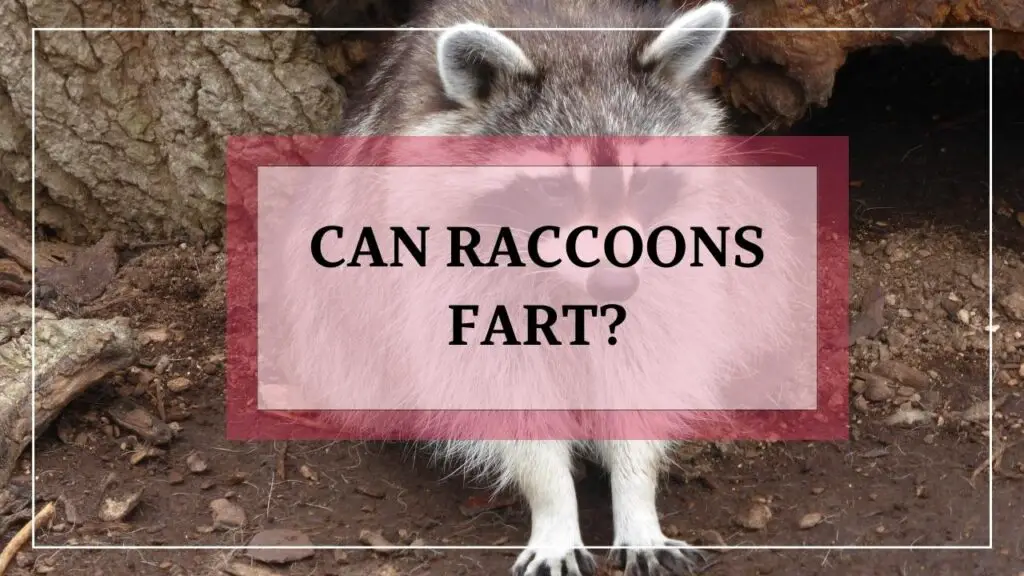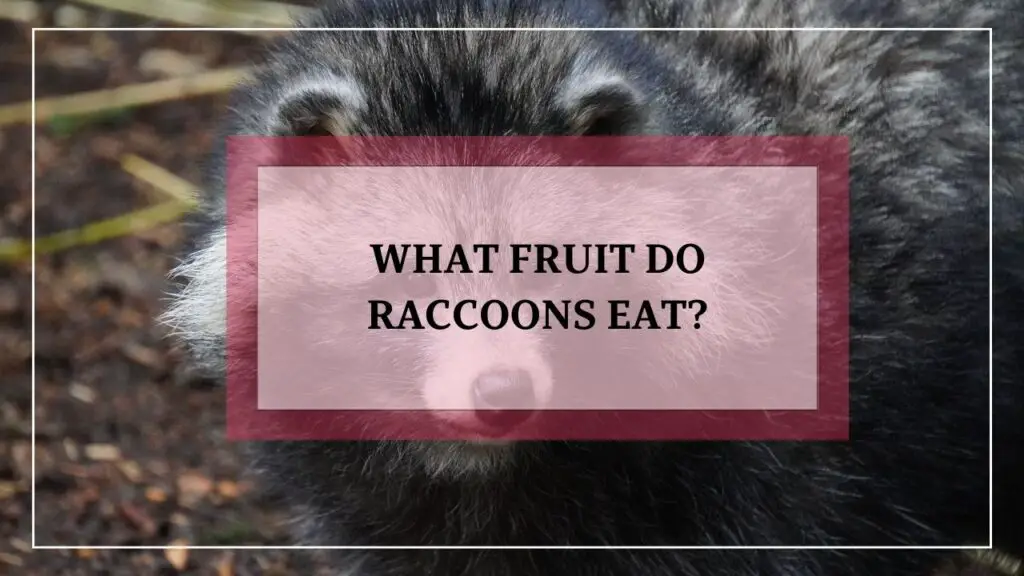Have you ever wondered if raccoons can fart? Well, today we are going to find out the answer to this interesting question! Raccoons are cute and mischievous animals that live in forests and sometimes even in cities. They have a furry body, a mask-like pattern on their face, and a fluffy striped tail. But when it comes to farting, do they do it too? Farting is a natural bodily function that happens when extra gas builds up inside our stomachs and needs to come out. Just like humans, animals also fart, but the way they do it might be different. While we know that cows and dogs can fart, the case for raccoons is not very clear. Some people say that raccoons can fart, while others think they cannot. Scientists are still studying this topic to give us a definite answer. So, let’s dive into the world of raccoons and find out if they really can fart!
Understanding the Digestive System of Raccoons
Hey there, raccoon enthusiasts! Today, we’re going to dive deep into the fascinating world of raccoon digestion. Have you ever wondered what happens to all that delicious food raccoons devour? Well, get ready to be amazed!
Overview of the Digestive Organs and Their Functions
First things first, let’s talk about the digestive organs that make it all happen. Raccoons have a digestive system similar to ours, consisting of the mouth, esophagus, stomach, small intestine, large intestine, and rectum. Each organ plays a crucial role in breaking down and absorbing nutrients from the food they eat.
How Food is Broken Down and Absorbed in the Digestive Tract
When a raccoon munches on its favorite snack, the process of digestion begins. The food enters the mouth, where it gets chewed and mixed with saliva. Then, it travels down the esophagus and into the stomach, where powerful acids and enzymes help break it down further. From there, the partially digested food moves into the small intestine, where the real magic happens. Here, nutrients are absorbed into the bloodstream and transported to different parts of the raccoon’s body. The remaining waste material then moves into the large intestine and eventually gets eliminated as raccoon poop.
Unique Aspects of Raccoon Digestion Compared to Other Animals
Now, here’s where things get interesting. Raccoons have a unique ability to adapt their diet based on what’s available. They are omnivores, meaning they can eat both plants and animals. This flexibility in their diet allows them to survive in various environments. Additionally, raccoons have a relatively short digestive tract, which means they can process food quickly. This helps them stay ready for their next adventure!
Can Raccoons Fart?
Definition and process of farting
So, how does farting actually happen? Well, when we eat, swallow air, or consume certain foods, our digestive system breaks down the food into nutrients. During this process, gases like nitrogen, oxygen, carbon dioxide, and methane are produced. These gases then need to find a way out of our bodies, and that’s where farting comes in!
When the gases build up in our intestines, they create pressure. Eventually, this pressure needs to be released, and our bodies do that by relaxing the muscles in the rectum, allowing the gases to escape as a fart. It’s a natural way for our bodies to get rid of excess gas and maintain digestive comfort.
Importance of gas release for digestion and comfort
Believe it or not, farting plays an important role in our digestive system. The release of gas helps relieve discomfort and prevents excessive bloating. If the gases were not released, they could cause pain and put additional strain on our digestive organs.
So, the next time you feel a rumble in your tummy, don’t hold it in – let it out! Your digestive system will thank you for it.
The Smell of Raccoon Farts
Now, let’s get down to the nitty-gritty – the smell of raccoon farts. We’ve all experienced the unpleasant odor that can come from passing gas, but raccoon farts seem to have a unique aroma of their own.
Factors contributing to the smell of raccoon farts
There are a few factors that contribute to the distinct smell of raccoon farts. First and foremost, it’s important to remember that gas is produced in the digestive system as a byproduct of the breakdown of food. This gas is made up of various compounds, including hydrogen sulfide, methane, and sulfur dioxide.
Raccoons have a diet that consists of both plant matter and animal protein, which can result in a more pungent odor compared to animals that primarily eat plant-based diets. The combination of different food sources can lead to a unique blend of gases being produced in their digestive system.
Comparison of raccoon farts to other animals’ farts
While it’s difficult to conduct a scientific study on the smell of farts across different species (imagine trying to collect samples!), anecdotal evidence suggests that raccoon farts may have a stronger odor compared to some other animals. However, it’s important to note that the smell can vary depending on the individual raccoon and their diet.
For example, herbivorous animals like cows and horses produce large amounts of methane gas, which can result in a distinct smell. On the other hand, animals that primarily consume a plant-based diet, such as rabbits or deer, may produce farts with a milder scent.
Possible reasons for the distinct odor of raccoon farts
While we can’t say for certain why raccoon farts have their own special fragrance, one theory is that the combination of different food sources in their diet leads to the production of sulfur-containing compounds. These compounds, such as hydrogen sulfide, are known for their strong, rotten egg-like smell.
Additionally, raccoons have a unique digestive system that allows them to break down a wide variety of foods, including fruits, vegetables, insects, and even small animals. This versatility in their diet may contribute to the distinct odor of their farts.
So, the next time you catch a whiff of a raccoon fart, remember that their diet and digestive system play a role in creating that interesting aroma.
Tips for Dealing with Raccoon Flatulence
Suggestions for managing raccoon flatulence in certain situations
So, you’ve got a gassy raccoon on your hands? Don’t worry, you’re not alone! Dealing with raccoon flatulence can be a challenge, but with a few handy tips, you’ll be able to navigate this smelly situation.
Tips for pet owners with gassy raccoons
If you have a pet raccoon that’s letting out some stinky toots, there are a few things you can try to help minimize the flatulence:
- Check their diet: Raccoons are omnivores, which means they eat both plant and animal matter. Make sure their diet is well-balanced and doesn’t contain any food that could be causing excessive gas.
- Slow down their eating: If your raccoon scarfs down their food too quickly, they might swallow air along with it, leading to more gas. Try using puzzle feeders or scattering their food to encourage slower eating.
- Probiotics: Just like humans, raccoons have gut bacteria that play a role in digestion. Adding a probiotic supplement to their diet might help promote a healthy balance of gut bacteria and reduce gas.
Strategies for reducing raccoon flatulence indoors or in confined spaces
If you have a raccoon living indoors or need to keep them in a confined space, here are a few strategies to minimize the smell of their flatulence:
- Air circulation: Make sure the area has proper ventilation to help dissipate any odors.
- Odor-neutralizing products: Consider using air fresheners or odor-neutralizing sprays to help mask any unpleasant smells.
- Frequent cleaning: Regularly clean the area where your raccoon spends time to remove any lingering odors.
Importance of maintaining a balanced diet for raccoons to minimize gas production
One of the most important things you can do to reduce raccoon flatulence is to provide them with a balanced diet. Just like humans, raccoons can experience digestive issues if their diet is too heavy on certain foods. Make sure their meals include a mix of protein, fiber, and carbohydrates to promote healthy digestion and minimize gas production.
Remember, dealing with raccoon flatulence may not always be a walk in the park, but with a little patience and these tips, you’ll be able to make the situation a little less stinky for everyone involved.
FAQs
Can raccoons fart?
Yes, raccoons can indeed fart. Just like many other animals, including humans, raccoons have digestive systems that produce gas during the digestion process. This gas is expelled from their bodies through farting.
Do raccoons fart a lot?
Raccoons, like any other animal, can experience varying levels of flatulence. The frequency of their farting can depend on factors such as their diet, overall health, and individual differences. However, it is important to note that raccoons are generally not known for excessive flatulence.
Why is there a myth about raccoons not being able to fart?
There is a common misconception that raccoons cannot fart, which likely stems from a popular internet meme. This myth is not based on any scientific evidence and has no factual basis. Raccoons, like all mammals, have the ability to pass gas, just like humans and many other animals.
Conclusion
In conclusion, understanding the digestive system of raccoons and the production of gas in their digestive system can provide valuable insights into their overall health and well-being. While there is some debate surrounding raccoon farting, it is clear that gas release is a natural and necessary process for digestion and comfort.
The digestive system of raccoons is a complex network of organs that work together to break down food and absorb nutrients. Gut bacteria play a crucial role in gas production, and various factors can influence the amount and type of gas produced.
While raccoon farts may be a subject of curiosity and amusement, it is essential to consider the environmental impact of these emissions. Raccoon farts contribute to greenhouse gas emissions and can potentially contribute to climate change. Minimizing the environmental impact of raccoon farts can be achieved through promoting a balanced diet and managing gas production in certain situations.
For pet owners or those dealing with raccoon flatulence in confined spaces, tips and strategies can help manage the issue more effectively. Maintaining a balanced diet for raccoons and implementing strategies to reduce gas production indoors can help create a more comfortable environment for both the raccoon and its human companions.
Overall, further research and scientific evidence are needed to fully understand the extent and significance of raccoon farting. By sharing our experiences and asking questions, we can continue to learn more about this intriguing aspect of raccoon biology and contribute to a better understanding of these fascinating creatures.



